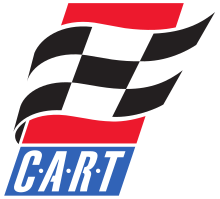| 1997 CART season | |
|---|---|
| PPG CART World Series | |
 | |
| Season | |
| Races | 17 |
| Start date | March 2 |
| End date | September 28 |
| Awards | |
| Drivers' champion | |
| Constructors' Cup | |
| Manufacturers' Cup | |
| Nations' Cup | |
| Rookie of the Year | |
The 1997 CART PPG World Series season was the nineteenth in the Championship Auto Racing Teams (CART) era of American open-wheel car racing. It consisted of 17 races, beginning in Homestead, Florida on March 2 and concluding in Fontana, California on September 28. The PPG CART World Series Drivers' Champion was Alex Zanardi. Rookie of the Year was Patrick Carpentier. Mercedes-Benz won their first and only CART engine-manufacturer's title.
Contents
- Drivers and constructors
- Season summary
- Schedule
- Race results
- Final driver standings
- Nations' Cup
- Chassis Constructors' Cup
- Engine Manufacturers' Cup
- See also
- References
After a settlement with the Indianapolis Motor Speedway, CART relinquished its license of the "IndyCar" trademark for 1997 and beyond. As a result, the series was renamed for the first time since 1980. The CART term, which had been mostly eschewed since 1992, was brought back and embraced, a new logo was unveiled, and participants were encouraged to refer to the machines of the CART series as "Champ Cars". The revival of the historic term (and curtailing the use of the mostly generic term "Indy cars") helped to differentiate the machines from those of the rival Indy Racing League, and was part of a concerted and necessary effort to distance the series from the Indianapolis 500, to which it no longer had any link. [1] This was also the last year of title sponsorship by PPG Industries, although the Driver's Championship continued to be known as the PPG Cup until 1999. This was the first season since 1983 not to feature Emerson Fittipaldi.
